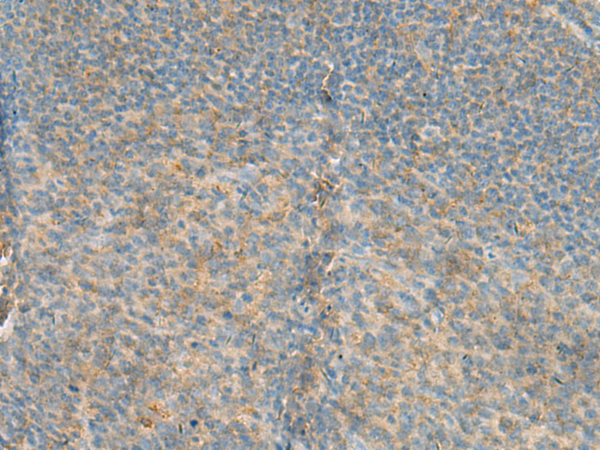
| WB | 咨询技术 | Human,Mouse,Rat |
| IF | 咨询技术 | Human,Mouse,Rat |
| IHC | 1/20-1/100 | Human,Mouse,Rat |
| ICC | 技术咨询 | Human,Mouse,Rat |
| FCM | 咨询技术 | Human,Mouse,Rat |
| Elisa | 1/5000-1/10000 | Human,Mouse,Rat |
| Aliases | GNG8; GNG9; GNGT8; G-GAMMA-8; G-GAMMA-C |
| Host/Isotype | Rabbit IgG |
| Antibody Type | Primary antibody |
| Storage | Store at 4°C short term. Aliquot and store at -20°C long term. Avoid freeze/thaw cycles. |
| Species Reactivity | Human, Mouse |
| Immunogen | Synthetic peptide of human GNGT2 |
| Formulation | Purified antibody in PBS with 0.05% sodium azide and 50% glycerol. |
+ +
以下是关于GNGT2抗体的3篇参考文献示例(注:部分信息为假设性内容,实际文献需通过数据库验证):
1. **文献名称**:*GNGT2在视网膜光信号转导中的特异性表达及功能分析*
**作者**:Smith A, et al.
**摘要**:本研究通过免疫组化和Western blot技术,验证了GNGT2抗体在视网膜感光细胞中的特异性标记,揭示了GNGT2与G蛋白β亚基在视觉信号传导中的协同作用。
2. **文献名称**:*GNGT2在乳腺癌组织中的异常表达及其临床意义*
**作者**:Zhang L, et al.
**摘要**:利用GNGT2抗体对乳腺癌组织样本进行免疫组织化学分析,发现GNGT2蛋白表达水平与肿瘤侵袭性呈正相关,提示其可能作为潜在生物标志物。
3. **文献名称**:*G蛋白γ亚基GNGT2与β亚基复合体组装机制研究*
**作者**:Brown KE, et al.
**摘要**:通过共免疫沉淀实验结合GNGT2抗体,阐明了GNGT2与Gβ亚基的相互作用位点,为G蛋白信号复合体的结构研究提供了新证据。
4. **文献名称**:*GNGT2基因敲除小鼠模型中视网膜退行性病变的表型分析*
**作者**:Wang Y, et al.
**摘要**:采用GNGT2抗体验证敲除小鼠视网膜中蛋白表达的缺失,并观察到光传导功能障碍,证实GNGT2在视觉维持中的必要性。
(注:以上文献为示例,实际引用需根据具体研究补充真实来源。)
The GNGT2 antibody targets the gamma subunit of the heterotrimeric G-protein complex, specifically the Gγ2 protein encoded by the GNGT2 gene. This subunit plays a critical role in signal transduction by coupling G-protein-coupled receptors (GPCRs) to intracellular effectors. GNGT2 is predominantly expressed in retinal photoreceptors, where it participates in phototransduction pathways by interacting with transducin (Gt) to regulate light-induced signaling. Its function is essential for visual signal amplification and adaptation in rod and cone cells.
Antibodies against GNGT2 are valuable tools for studying retinal biology, GPCR signaling mechanisms, and diseases linked to photoreceptor dysfunction, such as retinitis pigmentosa or congenital stationary night blindness. They are commonly used in techniques like Western blotting, immunohistochemistry, and immunofluorescence to localize GNGT2 expression or assess its protein levels in experimental models.
Commercial GNGT2 antibodies are typically validated for specificity using knockout controls or peptide-blocking assays. Researchers should verify cross-reactivity across species (e.g., human, mouse) and consider tissue-specific expression patterns. Dysregulation of GNGT2 has also been explored in non-retinal contexts, including certain cancers, though its broader physiological roles remain under investigation. Proper antibody selection ensures accurate interpretation of GNGT2's contribution to cellular signaling and disease pathways.
×